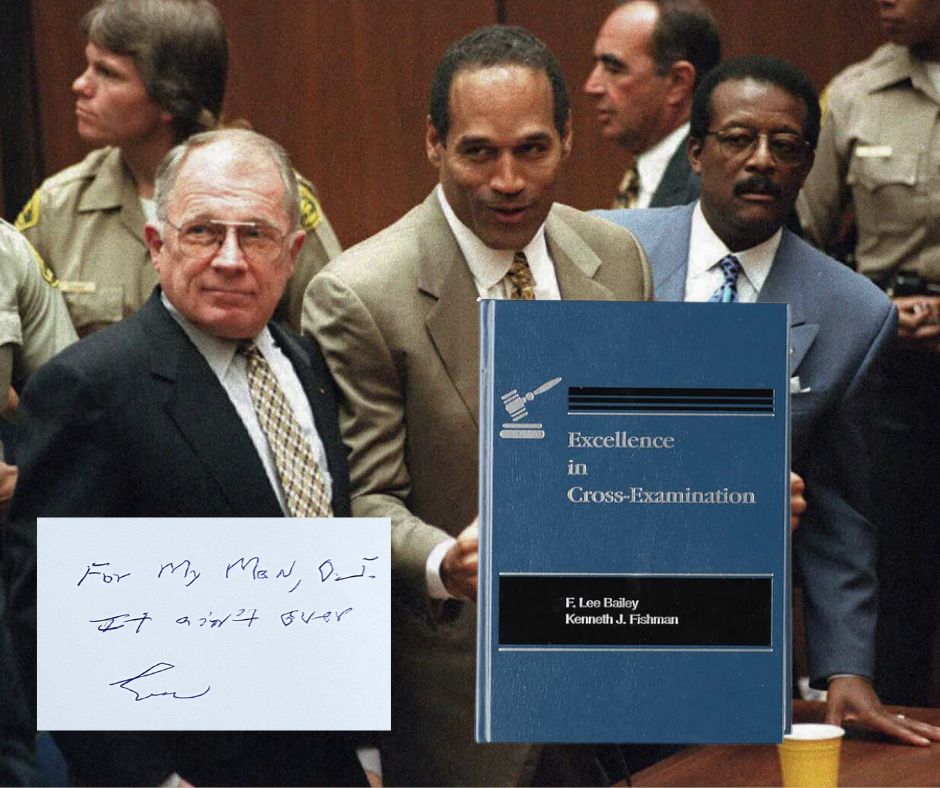
“It Ain’t Over” Inside the Trial of the Century: O.J. Simpson, Legal Strategy, and a Remarkable Artifact
Share
The Case That Captivated a Nation
Few criminal trials in American history have generated as much fascination, debate, and media coverage as The People of the State of California v. Orenthal James Simpson. From 1994 to 1995, the courtroom drama played out in front of a captivated global audience as O.J. Simpson—former NFL star, actor, and beloved public figure—was charged with the brutal murders of his ex-wife, Nicole Brown Simpson, and her friend, Ronald Goldman.
The trial became a cultural reckoning, igniting conversations about race, celebrity, policing, and justice in America. The stakes were enormous, and the legal teams were equally outsized.

Enter the “Dream Team” and the Power of Cross-Examination
Simpson’s defense assembled what would famously be known as the “Dream Team”—a powerhouse of top-tier attorneys including Johnnie Cochran, Robert Shapiro, Alan Dershowitz, and the formidable F. Lee Bailey.
The defense’s success hinged not just on undermining forensic evidence, but on controlling the narrative in the courtroom. At the heart of that strategy was cross-examination—a skill at which Bailey particularly excelled. With his razor-sharp questioning and theatrical flair, Bailey systematically dismantled the prosecution’s witnesses, most notably LAPD Detective Mark Fuhrman, whose credibility crumbled under pressure.
Bailey’s mastery of cross-examination turned legal theory into courtroom reality—and helped shift the course of the trial.

A Haunting Artifact from a Second Legal Battle
Now offered at auction through our collection is a remarkable and thought-provoking piece from the Simpson legal saga: O.J. Simpson’s personally owned copy of Excellence in Cross-Examination by F. Lee Bailey and Kenneth J. Fishman.
Bound in dark blue with silver and black accents, this volume delves into the nuanced strategies of dismantling witness testimony—an art form at the heart of courtroom drama. But in 2013, nearly two decades after his infamous murder trial, Simpson once again found himself in court—this time not fighting for freedom from a criminal charge, but seeking a retrial in his Nevada kidnapping and armed robbery conviction. He claimed ineffective counsel, and the credibility of his former attorney was center stage.
In that moment, cross-examination was no longer just a legal tactic—it was the tool Simpson hoped would open the door to a second chance. This book, authored by one of his original Dream Team attorneys, may have once served as inspiration or even instruction. Now, it stands as a silent witness to Simpson’s ongoing struggle with the justice system—a roadmap not to his acquittal, but to redemption he never fully achieved.
From Estate to the Gallery
Following his 1995 acquittal, O.J. Simpson was later found civilly liable for the wrongful deaths of Nicole Brown Simpson and Ronald Goldman in a 1997 civil trial. The jury awarded the Goldman family $33.5 million in damages, a judgment that has remained largely unpaid. In the years that followed, items from Simpson’s estate and personal collection were seized, sold, or consigned to help satisfy the debt.
This copy of Excellence in Cross-Examination, which had been part of Simpson’s personal library, is one of those items. It was sold off as part of efforts to recover civil damages owed to the Goldman family—transforming it from a private possession into a public artifact of cultural and legal significance. Its journey from Simpson’s bookshelf to the auction block only deepens its connection to the legacy of the trial and its lasting impact.

F. Lee Bailey: The Architect of the Interrogation
F. Lee Bailey was no stranger to high-stakes trials. By the time he joined Simpson’s defense, he had already represented clients such as Dr. Sam Sheppard, the Boston Strangler, and Patty Hearst. Known for his confrontational style, legal brilliance, and love of the spotlight, Bailey was a force in the courtroom—especially when it came to breaking down prosecution witnesses under cross-examination.
His legal tactics were performances designed to provoke, reveal, and ultimately persuade. The fact that his written guide on the subject was in Simpson’s possession adds an unsettling and intriguing dimension to this story and artifact.

"It Ain’t Over"—A Message That Outlived the Trial
It doesn’t get more loaded than this. Scrawled boldly in blue ink inside the front cover of O.J. Simpson’s personal copy of Excellence in Cross-Examination is a haunting inscription from its co-author and Simpson’s famed defense attorney, F. Lee Bailey:
"For My Man, O.J.
It ain’t over
—Lee"
Those three words—It ain’t over—now carry a weight far beyond their original intent. When Bailey gifted Simpson this book, the murder trial was in the rearview mirror, but legal storm clouds were once again forming. By 2013, Simpson was deep in a new battle: not for vindication, but for a second chance. From a Nevada prison cell, he launched a bid to overturn his conviction for armed robbery and kidnapping—ironically arguing ineffective counsel. Once again, courtroom strategy was everything. Once again, the stakes were his freedom.
In this light, Bailey’s message reads less like a motivational nod and more like a prophecy. Whether it was meant as solidarity, defiance, or a whispered warning, it’s clear this was no ordinary gift. It was a battle cry from a seasoned warrior of the courtroom, passed to a man whose life had been shaped—and nearly destroyed—by legal warfare.
Today, this inscription transforms Excellence in Cross-Examination from a legal reference into a personal relic—one that captures the strange, almost mythic bond between client and counsel. It feels cinematic in its brevity, chilling in its accuracy. Simpson’s story didn’t end with the verdict in 1995, and Bailey knew it.

The Gloves That Changed Everything
Perhaps the most iconic moment of the 1995 OJ Simpson trial came when prosecutors asked him to try on a blood-stained glove found at the crime scene. In full view of the jury, Simpson struggled to fit it on. The moment electrified the courtroom and gave the defense a devastating piece of visual rhetoric.
Johnnie Cochran’s famous line—“If it doesn’t fit, you must acquit”—became one of the most memorable phrases in legal history. Whether it was a prosecutorial miscalculation or a masterstroke by the defense, the glove demonstration remains a symbol of how courtroom theatrics can overpower forensic evidence.
A Glimpse of What’s to Come
As we prepare to offer Simpson’s personally owned copy of Excellence in Cross-Examination, we’re reminded of how powerful these physical remnants of history can be.
And for those intrigued by this chapter of American legal history, let’s just say: this isn’t the last time you’ll hear from us on the subject. An item tied even more closely to one of the trial’s most unforgettable moments will soon be stepping into the spotlight at the Historical Gallery of Relics!
Stay tuned.
History, evidence, and legacy converge in unexpected and unforgettable ways— and a personally owned example of one of the most talked-about artifacts of the Simpson case is closer than you think.
